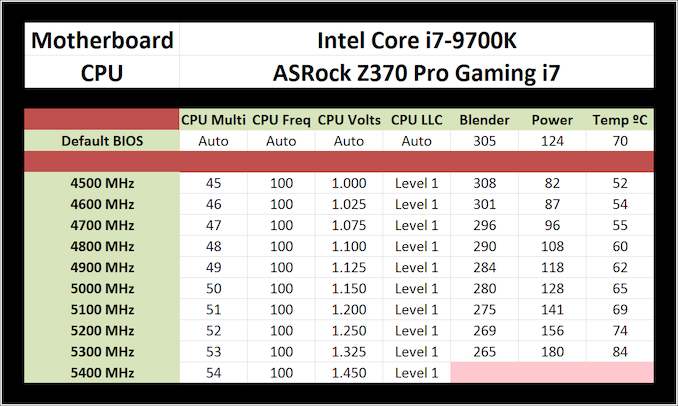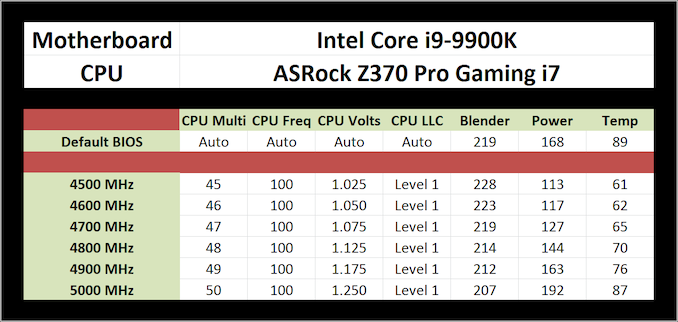The Intel 9th Gen Review: Core i9-9900K, Core i7-9700K and Core i5-9600K Tested
by Ian Cutress on October 19, 2018 9:00 AM EST- Posted in
- CPUs
- Intel
- Coffee Lake
- 14++
- Core 9th Gen
- Core-S
- i9-9900K
- i7-9700K
- i5-9600K
Overclocking
With the upgraded thermal interface between the processor and the heatspreader, from paste to solder, Intel is leaning on the fact that these overclockable processors should be more overclockable than previous generations. We’ve only had time to test the Core i9-9900K and i7-9700K on this, so we took them for a spin.
Our overclocking methodology is simple. We set the Load Line Calibration to static (or level 1 for this ASRock Z370 motherboard), set the frequency to 4.5 GHz, the voltage to 1.000 volts, and run our tests. If successfully stable, we record the power and performance, and then increase the CPU multiplier. If the system fails, we increase the voltage by +0.025 volts. The overclocking ends when the temperatures get too high (85C+).
For our new test suite comes new overclocking features. As mentioned in the previous page, our software loading for power measurement is POV-Ray, which can thrash a processor quite harshly. POV-Ray also does a good job on stability, but is not a substantial enough test – for that we use our Blender workload, which pushes the cores and the memory, and lasts about 5 minutes on an 8 core processor.
Results as follows:
For the Core i7-9700K, we hit 5.3 GHz very easily, for a small bump in power and temperature. For 5.4 GHz, we could boot into the operating system but it was in no way stable – we were ultimately voltage/temperature limited at this case. But an eight core, eight thread 5.3 GHz CPU at 180W for $374? Almost unimaginable a year ago.
Overclocking the Core i9-9900K was not as fruitful. The best bit about this overclock is the 4.7 GHz value: by using our own voltage settings, we reduced power consumption by 41W, almost 25% of the total power, and also reduced temperatures by 24ºC. That's a safe idea. Even 4.8 GHz and 4.9 GHz was reasonable, but the temperatures at 5.0 GHz might not be for everyone. When all cores and threads are loaded, this is one warm chip.












274 Comments
View All Comments
mapesdhs - Sunday, October 21, 2018 - link
Tell that to AutomaticTaco, his posts read like a shill mission atm.PG - Saturday, October 20, 2018 - link
How is the 2600X beating the 2700X in Ashes ?How is the 1800X beating the 2700X in AES?
2700x results are too low in some areas.
Nikorasu95 - Saturday, October 20, 2018 - link
Did I just fu*king downgrade by purchasing the i9 9900K when I have the i7 8700K? Like WTF? Some gaming results show the i7 is beating the i9. Like what is going on here? The i9 should be ahead of both the i7 8700K, and 8086K in all gaming tests considering it has 2 extra cores. Once again WTF is going on here with these results? They are inconsistent and make no sense!eastcoast_pete - Saturday, October 20, 2018 - link
@Ian / Anandtech: With the high premium over the MSRP for a 9900K, the difference vs. an 8700K is easily $ 200 as of now. So, here a suggested comparison that even stays in the Intel family: A comparison of a system with the 9900K with the (obligatory) high-end air cooler (so, another $ 100) vs. an 8700K based system at the same price point. Both with the identical graphics card (1080 GTX or 2070), but with the money saved with the 8700K then spent on delidding, a nice liquid cooler AND really fast DDR4? I believe that latter could really make a difference: While Intel's memory controller specifies rather slow DDR4 RAM, it's well known that one can effectively make use of much faster DDR4 RAM, and that has been shown repeatedly at least for the 8700/8700K. So, in a dollar-for-dollar matched comparison, would the 9900K then still be the king of the hill? I, for one, doubt it.eastcoast_pete - Sunday, October 21, 2018 - link
I have to recall my own comment, after checking prices at Newegg and Amazon. The current Intel 14 nm shortage has now also driven 8700/8700K prices far above their MSRP. This invalidates the performance/price = value equation my comment was based on, although the 8700K is still notably less than the even more overpriced (and out of stock) 9900K. Right now, building an Intel i7 rig is really questionable, unless one really, really wants (thinks one needs) those last few fps in some games and has plenty of money to burn. Assuming one uses the same video card, a Ryzen 2700 (or 2700x) setup with 16 GB of fast DDR4 RAM is cheaper, and if overclocking is on your mind, spend the difference to an 8700 (K or not) on a good liquid cooling setup.mapesdhs - Sunday, October 21, 2018 - link
For gaming, what it effectively does is push the "on the same budget" equation firmly into the camp of buying a 2700X and using the saving to get a better GPU. Only time this wouldn't apply is if someone does not have any kind of budget limit, but that has to be a tiny and largely irrelevant minority.SaturnusDK - Tuesday, October 23, 2018 - link
If you're planning to have a decent GPU and game at 1440p or higher then absolutely no Intel CPUs, at any price point, at the moment makes sense to buy. The 2700X is less than $300 at the moment, about half the price of a 9900K, and the 2600 is $160 at the moment, about half the price of a 8700K. Both AMD CPUs match or is only marginally behind the respective core/thread Intel equivalent at double the price.coburn_c - Saturday, October 20, 2018 - link
Under the Mozilla Kraken label you have a power consumption graph.Rumpelstiltstein - Saturday, October 20, 2018 - link
"Intel Core i9 9900K: The fastest gaming CPU"Uh, really Intel? Looks like that's the 9700K.
The Original Ralph - Saturday, October 20, 2018 - link
Looks like all this might be a moot point for awhile: Amazon hasn't started shipping, Newegg is not only stating "out of stock" but "NOT AVAILABLE" and B&H photo is showing availability date as "JAN 1, 2010" - i kid not. Suspect there's an issue with intel deliveries